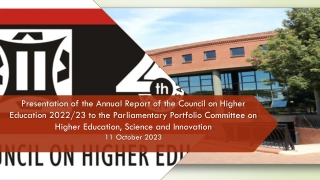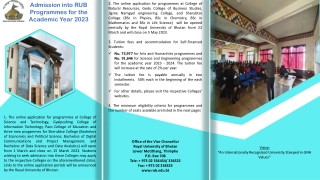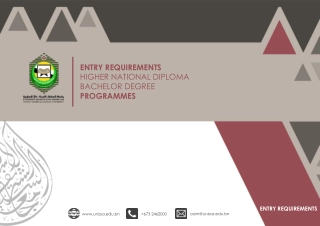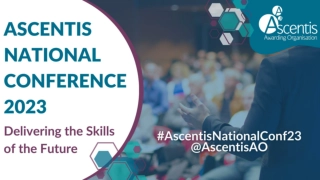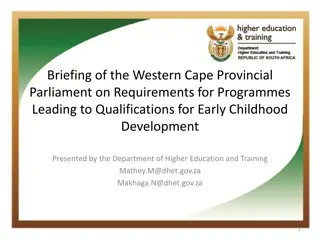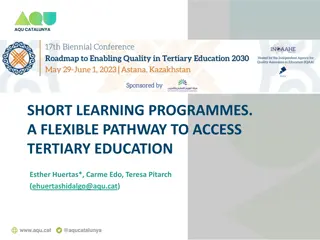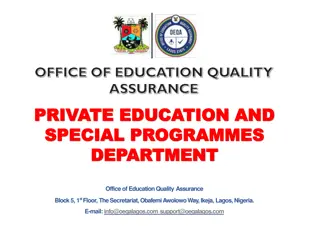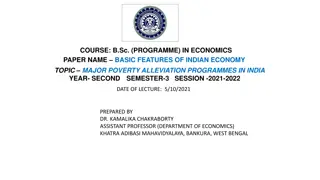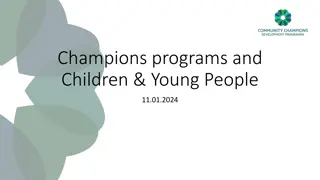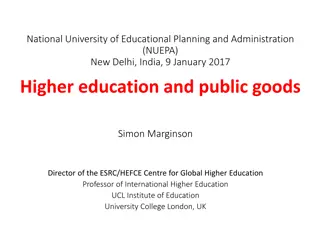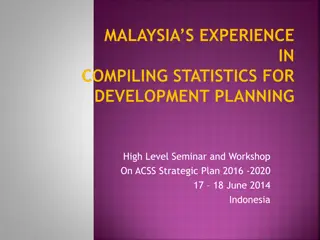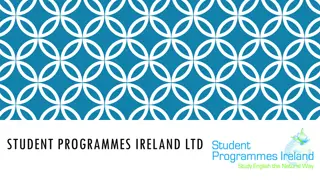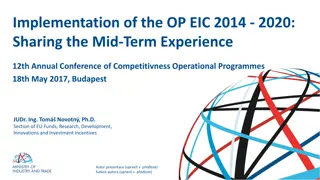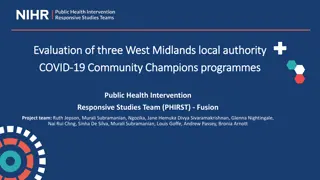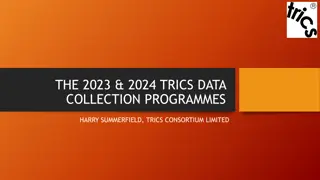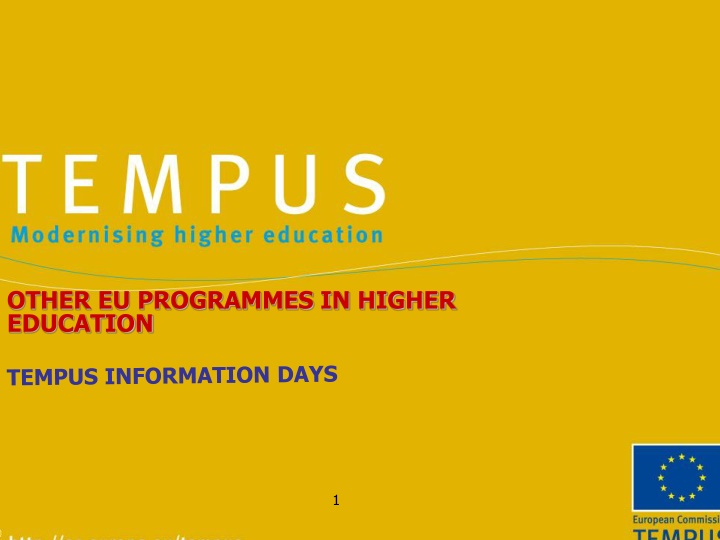
European Higher Education Programmes and Scholarships
Explore EU programmes like Erasmus Mundus and Jean Monnet offering joint master and doctoral programs, scholarships, and promoting quality education across Europe and worldwide. Learn about the Erasmus Mundus II Cooperation and Mobility Programme focused on enhancing educational quality and fostering intercultural understanding through global cooperation.
Download Presentation

Please find below an Image/Link to download the presentation.
The content on the website is provided AS IS for your information and personal use only. It may not be sold, licensed, or shared on other websites without obtaining consent from the author. If you encounter any issues during the download, it is possible that the publisher has removed the file from their server.
You are allowed to download the files provided on this website for personal or commercial use, subject to the condition that they are used lawfully. All files are the property of their respective owners.
The content on the website is provided AS IS for your information and personal use only. It may not be sold, licensed, or shared on other websites without obtaining consent from the author.
E N D
Presentation Transcript
OTHER EU PROGRAMMES IN HIGHER EDUCATION 1
OTHER EU PROGRAMMES RELATED TO HIGHER EDUCATION 1. Erasmus Mundus 2. Jean Monnet 3. Bilateral Cooperation with Industrialised Countries:US/Canada/ICI
ERASMUS MUNDUS II (2009-2013) Cooperation and mobility programme in the field of higher education for: the enhancement of quality in European higher education; the promotion of the European Union as a centre of excellence in learning around the world; the promotion of intercultural understanding through cooperation with Third Countries as well as for the development of Third Countries in the field of higher education.
Erasmus Mundus 2009-2013 3 ACTIONS Action 1 Joint Programmes - Joint Master and Doctoral Programmes - Implemented by EU and non EU universities - Scholarships for non EU and EU students for the entire duration of the joint study programme Action 2 Partnerhips (Ex-External Cooperation Window) - Partnerships projects with non-European HE institutions - Scholarships for EU and non EU students - On all levels of education - In a variety of disciplines Action 3 Promotion of European Higher Education - Attractiveness Projects - Studies - Information activities of EM National structures
ACTION 1 Joint masters and doctoral programmes including a scholarship scheme Designed and implemented by a consortium of European universities from at least 3 different countries. (Applicant: EU HEI) Consortia may also include universities from other parts of the world. Scholarships/fellowships are open to higher education students and academics from all over the world. Programmes include obligatory study and research periods, in at least 2 universities and award recognised double, multiple or joint degrees. If selected, funded for five consecutive editions of the joint programme.
ACTION 1 Joint masters and doctoral programmes including a scholarship scheme Flat rate for consortium management ( 30 000) EMMC student scholarships cover: Installation costs Monthly allowance costs Participation costs (fees, insurance) Max 2 years 48 000 EMMC individual scholar scholarships cover: Living allowance (max 14 800 for 3-month stay) EMJD doctoral fellowships cover: Travel and installation costsInstallation costs Participation costs for doctoral candidate Living allowance Maximum fellowship ranges from 61 200 to 129 900
EM Masters: scholarships for Tempus region EM student scholarships 2004-2009: Tempus regions Caucasus Central Asia Eastern Europe Middle East North Africa Western Balkans Rest of world 8
Action 1 Results 2009 50 new Erasmus Mundus Masters Courses selected 231 EU HEIs involved 58 3rd country partner HEIs 77 3rd country associated partners 116 Masters Courses offering scholarships 2010 13 Erasmus Mundus Joint Doctorates selected 65 EU HEIs involved 14 3rd country partner HEIs 21 3rd country associated partners
ACTION 2 Partnerships (Ex-External Cooperation Window) Establishment of cooperation partnerships between European and Third countries HEI in a specific region Objective: Organise and implement structured individual mobility arrangement between the European and Third Country partners. Scholarships of various lengths (3 months to 3 years) Scholarships for bachelor, master, doctorate and post- doctorate students and HE staff Special attention is given to disadvantaged groups and populations in a vulnerable situation.
ACTION2 Partnerships (Ex-External Cooperation Window) Composition: At least 5 European HEIs from at least 3 EU countries At least 1 HEI from each country in geographic lot Maximum size partnership: 20 partners
ACTION 2 Partnerships (Ex-External Cooperation Window) Funding: 10 000 per partner flat rate for partnership management Individual mobility scholarships for students and staff (including travel, insurance, living allowances and, if applicable, tuition fees). Undergraduate + Master scholarship: 1000/month + tuition fees ( 3.000) + insurance ( 75/ month) Doctorate scholarship: 1500/month + tuition fees ( 3.000) + insurance ( 75/ month) Post doctorale scholarship: 1800/month + tuition fees ( 5.000) + insurance ( 75/ month) Academic staff fellowship: 2500/month + insurance ( 75/ month)
Action 2 2009 Lots in Tempus region Lot 5 Russia Lot 9 5 Central Asian republics Lot 7 Belarus, Moldova, Ukraine Lot 10 W. Balkans Lot 6 Georgia, Armenia, Azerbaijan Lot 4 Jordan, Syria, Lebanon Lot 3 OPT, Israel Lot 1 Algeria, Morocco, Tunisia Lot 2 Egypt
Action 2 partnerships 2010-2013: regions (budget 2010, approx figures) (target: around 100 partnerships) Neighbourhood & Russia 33M, 1225 sch W. Balkans 12M, 720 sch Yemen, Iran, Iraq 3M, 110 sch ICI strand 7.5M, 150 sch Asia region 24.75M, 1100 sch ACP 6M, 200 sch South Africa 4.8M, 150 sch Argentina 4.4M 130 sch
ACTION 3 Promotion of European Higher Education Promotes European higher education through measures enhancing the attractiveness of Europe as an educational destination and a centre of excellence at world level. Type of activities - Funding for Attractiveness projects - Studies, Calls for Tender - Support to the EM Alumni Association activities: Network of current and former Erasmus Mundus Students (active role in promoting the programme, assisting future EM students, etc.)
BUDGET 2009-2013 overall budget of almost 1 billion euros 463.8 Million EUR for Action 1 460 Million EUR for Action 2 16 Million EUR for Action 3
Impact and benefits: institutions Improve the visibility of your department/faculty/ institution (at local, regional, national or international level) Increase its attractiveness in recruiting highly qualified European and third country students/doctoral candidates/ scholars Create a strong cooperation network with European and third country partners Facilitate the exchange of good practices and innovation process Secure financial support for your academic, research and inter-university mobility activities.
Impact and benefits: students Have a unique learning experience in a foreign country Develop international skills: cross-cultural adaptability, self confidence, language capacities Enhance employability of students in an international environment Receive a joint/double degree or recognition of study abroad (e.g. Diploma Supplement) Enhance quality of teaching and academic exchange of knowledge, ideas and contacts 18
2010 Planning November 2009: Publication of the new call 22 January 2010: Info-Day in Brussels End April 2010: Deadline for submission of proposals http://eacea.ec.europa.eu/erasmus_mundus/index_en Contact: EACEA-Erasmus-Mundus@ec.europa.eu
THE JEAN MONNET PROGRAMME Aims at stimulating teaching, research and reflection in the field of European integration studies at the level of higher education institutions within and outside the European Community. Present in 62 countries throughout the world. Around 740 universities offer Jean Monnet courses as part of their curricula. Between 1990 and 2009: has helped to set up approximately 3,500 projects in the field of European integration studies, including 141 Jean Monnet European Centres of Excellence, 775 Chairs and 2,007 permanent courses and European modules. The Jean Monnet Action brings together a network of 1,500 professors, reaching audiences of 250,000 students every year.
THREE KEY ACTVITIES Key activity 1: Jean Monnet Action (call for proposals) Key activity 2: Support specified institutions dealing with issues relating to European integration Key activity 3: European associations active at European level in the field of education and training (call for proposals)
KEY ACTIVITY 1: JEAN MONNET ACTION (support for University-level projects on European integration) Includes the creation of Jean Monnet Chairs, Centres of Excellence, Modules, Information and Research activities as well as support for academic associations of professors and researchers in European integration and multilateral research groups.
KEY ACTIVITY 1: JEAN MONNET ACTION Teaching activities Jean Monnet Chair: teaching post with a specialization in European integration studies for a minimum of 90 hours per academic year. Ad personam" Jean Monnet Chair: former Jean Monnet Chair holders with evidence of high-level international teaching and publication record and/or professors with a distinguished background as former high-level practitioners in the field of European integration. Jean Monnet Centre of Excellence: multi-disciplinary structure pooling scientific, human and documentary resources for European integration studies and research within one or more universities. European Module: short programme of European integration study, minimum 40 teaching hours per academic year, may be multi-disciplinary.
KEY ACTIVITY 1: JEAN MONNET ACTION Academic and research activities Association of professors and researchers, whose explicit purpose is to contribute to the study of the European integration process and whose aim is to enhance the visibility of regional or national scientific and physical resources in this domain. Information and research activities, aiming to promote discussion, reflection and knowledge about the European integration process through conferences and seminars. Jean Monnet multilateral research groups, research partnership leading to an integrated academic network with a joint research plan and multi-disciplinary synergies in the field of EU studies.
KEY ACTIVITY 2: SUPPORT SPECIFIED INSTITUTIONS DEALING WITH ISSUES RELATING TO EUROPEAN INTEGRATION Support for six specific academic institutions pursuing an aim of European interest: College of Europe, Bruges, Belgium European University Institute, San Domenico di Fiesole, Italy European Institute of Public Administration, Maastricht, The Netherlands Academy of European Law, Trier, Germany International Centre for European Training, Nice, France European Agency for Development in Special Needs Education, Odense, Denmark
KEY ACTIVITY 3: EUROPEAN ASSOCIATIONS ACTIVE AT EUROPEAN LEVEL IN THE FIELD OF EDUCATION AND TRAINING Provide operating grants to support certain operational and administrative costs of European associations active in the fields of education and training. These European associations must be present in at least 12 EU Member States.
NEXT CALL FORPROPOSALS Deadline for proposal submission: 12 February 2010 http://eacea.ec.europa.eu/llp/ajm/2010/index_en.htm Contact: EACEA-AJM@ec.europa.eu
3. Bilateral Cooperation with Industrialised Countries
Bilateral Cooperation with Industrialised Countries Main objectives: To enhance the quality of higher education and training in Europe and in the Partner Countries. To improve the quality of human resources in the EU and Partner Countries by facilitating the acquisition of skills required to meet the challenges of the global knowledge-based economy. To promote mutual understanding between the peoples of the EU and Partner Countries, including a broader knowledge of their languages, cultures and institutions.
Bilateral Cooperation with Industrialised Countries Operational objectives: Promote joint study programs and mobility. Improve the quality of student mobility between the EU and the partner countries by promoting transparency, mutual recognition of qualifications and periods of study and training, portability of credits. Support collaboration between public and private organisations active in the field of HE and vocational training in order to encourage discussion and exchange of experience on policy issues. Support mobility of professionals between the EU and the partner countries.
Bilateral Cooperation with Industrialised Countries Programmes EU-US ATLANTIS Programme EU-CANADA Transatlantic Exchange Partnerships (TEP) Programme EU-ICI ECP - Education Cooperation Programme Australia, Japan, New Zealand and Republic of Korea
GEOGRAPHICAL AREA CANADA KOREA E.U . U.S.A. JAPAN AUSTRALIA New ZEALAND
Bilateral Cooperation with Industrialised Countries Activities funded Development of curricula from common modules to double degrees programmes Exchanges of students with provision for credit recognition Exchanges of faculty International internships
Bilateral Cooperation with Industrialised Countries Key features of co-operation activities: Joint selection and funding by the countries concerned; All fields in higher education and vocational training; Under graduate/Bachelors and Graduate/Masters levels; Balanced partnerships; Joint development of innovative curricula; Two-way exchange of students with full recognition of study abroad, possibility of internships; Faculty exchanges.
Bilateral Cooperation with Industrialised Countries Next call for proposals USA/Canada: end of November 2009 Other programmes: to be confirmed Internet: http://eacea.ec.europa.eu/extcoop/index_en.htm Mailboxes: EACEA-EU-CAN@ec.europa.eu EACEA-EU-US@ec.europa.eu EACEA-ICI-ECP@ec.europa.eu

